Follow our live blog from the public inquiry into the Post Office Horizon scandal
4.05pm: Last to ask questions today is the representative of expert witness Gareth Jenkins. He will give evidence over the course of four days in June. Smith reiterates his admission from earlier that he did not comply with his duties to ensure Jenkins knew about his obligations as an expert witness.
The inquiry breaks for the day. Tomorrow will feature the return of criminal solicitor Jarnail Singh, whose name has appeared so many times in disclosure from 2010 onwards. We will be back in the morning with all the details from that.
3.50pm: The inquiry sees a Cartwright King document from December 2013 which concluded that the Misra case ‘clearly passes the disclosure threshold’ and that the Second Sight report should be given to her lawyers.
But six weeks later, the firm had changed its stance – Henry calls it a ‘complete backflip’. Smith says he does not remember why the opinion changed.
Henry repeatedly urges Smith to ‘tell the truth’ about what happened to make this u-turn happen.
Henry suggests that somebody obviously put pressure on the firm ‘because of the ramifications Mrs Misra’s inevitable appeal would have had for both criminal and civil litigation’.
‘With respect that is nonsense,’ says Smith, who says the firm simply thought by January 2014 that Misra’s lawyers had enough information.
3.45pm: The meeting notes record that at one point a Post Office lawyer asked whether the organisation should apologise to Misra. Altman's response is recorded as 'I wouldn't.'
Altman is due to give evidence to the inquiry next Wednesday.
3.35pm: The minutes state that Misra was a case 'slipping through the net'. Brian Altman KC, who was present at the meeting, suggests that there should be no approach to Misra to join the mediation scheme and instead they should wait for her to come forward.
Henry says: 'No-one wanted to provide Mrs Misra with a ticket - to use your words - to the Court of Appeal.'
Smith replies: 'The Post Office did not want at that stage to be actively encouraging people to go to the Court of Appeal.'
Henry says: 'You know why that was, don't you?'
Smith replies: 'I take it you are going to enlighten me.'
Henry says: 'Oh come on, must we play games?'
3.25pm: After the break, Edward Henry KC begins his questions with Seema Misra sitting alongside him.
He goes straight to the minutes of a meeting of lawyers recorded by Smith from September 2013.
The lawyers discussed keeping Fujitsu 'on the outside' of the Gareth Jenkins situation and taking a tactical point of view not to let them know what was happening.
Smith is asked whether this is part of the cover-up that was going on.
There is a long period of silence, broken when Henry says: 'I am not going to waste my 20 minutes by waiting for an answer.'
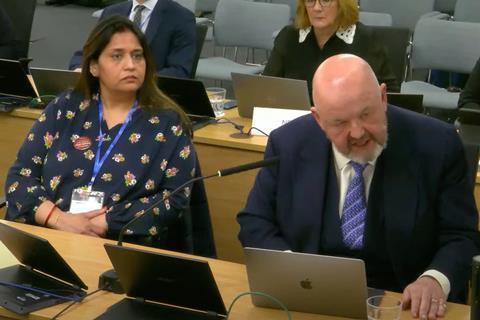
3pm: Sam Stein KC is the next victims' representative to address Smith, and he goes flying in with a series of quickfire questions about ethics, integrity and his duties as a solicitor. Smith accepts he did not have the 'requisite skill and expertise' for the role he was in.
Did he try to find out what duties he had? No.
Stein asks whether Smith ever considered calling the police after being told about Gareth Jenkins evidence to the court being dishonest?
Smith replies: 'I don't think that is anything we thought about.'
Stein concludes by saying that by July 2013 Smith and Cartwright King were 'hopelessly conflicted' in their role advising on prosecutions while knowing the various reasons why convictions in the past had been unreliable.
Smith replies: 'I don't think that crossed our minds.'
We go to a break.
2.50pm: The meeting itself was not disclosed to the defence. The application was for a public interest immunity, but Smith insists he did not understand what this was and he was only there to make notes on behalf of Clarke. Smith is asked whether Clarke raised with the judge that there was a widespread loss of confidence in Horizon and whether the Post Office wanted to reduce adverse publicity. Smith repeatedly answers that he cannot remember details of the meeting with the judge.
2.45pm: Tim Moloney KC gets his chance to question Smith and goes straight for a meeting held in private with a judge on the eve of a 2013 trial involving a sub-postmaster at Birmingham Crown Court.
Smith and his colleague Simon Clarke made a successful application to withhold the existence of the Second Sight interim report, which had recently been produced and may be of great interest to defence lawyer.
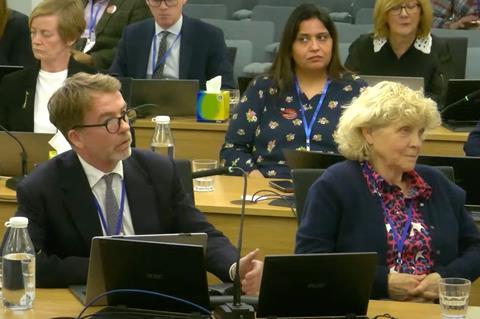
2.10pm: We are onto disclosure discussions around the mediation scheme. Minutes from a meeting between Smith and Bond Dickinson's Andy Parsons where they discussed whether disclosure might give a 'ticket to the Court of Appeal' to Seema Misra (pictured below), who had been wrongly convicted in 2010 while she was pregnant with her second child. The group also discussed whether reports of individual cases should be 'watered down'. Smith says sub-postmasters were free to appeal and he denies having been concerned about helping her make a challenge.
Misra is sitting in the inquiry room, it should be noted.
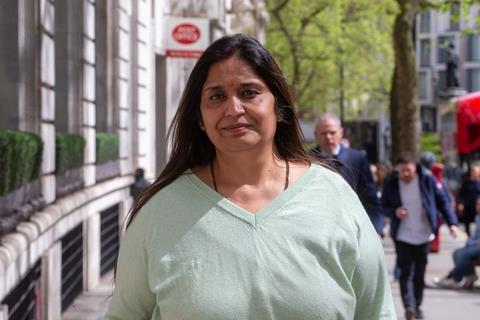
1.10pm: The inquiry then sees advice from Smith to specifically redact from any disclosure an internal Post Office report from 2005 that Horizon was being looked at (see below). Blake asks whether this could possibly be justified.
Smith gives a long pause, before simply saying: 'I really don't know.'
Pressed further, he adds: 'I clearly got that wrong. I can't see anything here which sensibly should be redacted.'
The inquiry breaks for lunch.
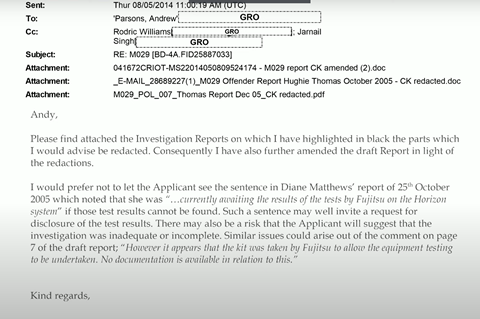
1pm: A very uncomfortable period for Smith, who takes much longer to answer when he is questioned about disclosure and redactions in relation to a review of the prosecution of Noel Thomas (pictured below). He spent 13 weeks in jail for false accounting in 2006 after his books fell short by £48,000. His conviction was overturned in 2021.
The inquiry sees advice given by Smith in relation to the disclosure of the investigation report from the time of Thomas' conviction. Smith suggested at the time this should not be disclosed or at least should be heavily redacted.
The solicitor says that was the firm's advice at the time and he tended to work from the expertise of counsel in Cartwright King, but Blake steps in.
'You are a lawyer from Cartwright King, you are communicating with the client - that is surely your advice?' asks Blake.
'It is my advice but those are the strong views of Mr Bowyer and Mr Clarke and I accepted that,' says Smith.
'Mr Smith, you were not on work experience with Mr Clarke,' responds Blake.
'I was aware they had a substantial amount of experience in prosecution cases.'
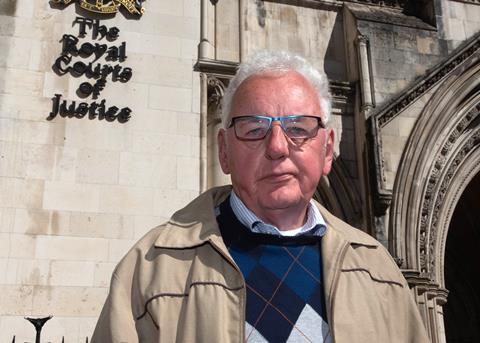
12.50pm: Smith says Cartwright King was a defence firm with no specialism in prosecutions when it was taken on by Post Office.
'Quite why Cartwright King thought it was appropriate to take on this prosecution with hindsight I have no idea, because we certainly didn't have the training for it,' he says.
'I was simply not aware of the duties on a prosecutor to make sure an expert witness was fully aware of their duties.'
He adds that the approach to expert witnesses was 'undoubtedly not compliant.'
12.45pm: Smith says he did not have concerns that there may have wrongdoing on the part of the Post Office and Fujitsu, saying his attitude at the time was 'why on earth would you think things that were sinister would be happening?'
12.40pm: The inquiry sees minutes from a meeting in 2016 attended by Smith. Post Office in-house solicitor Rodric Williams asked for 'no email traffic' on the issue of a bug that had been detected more than a decade earlier in the Wimbledon branch and which might have affected other branches.
Another minute shows that Smith instructed that Wimbledon 'can be taken off this agenda' and that Smith and Williams were to 'work offline'.
Smith concedes that it looks from this like there was an instruction not to correspond in public but he says he believed at the time the Wimbledon issue had already been flagged up so did not need further discussion.
Blake asks how he could be so relaxed about this after everything he had found out about expert witnesses, bugs in the system and potential wrongful convictions.
'I took the view it was being dealt with,' says Smith.
12.20pm: Discussions about the records of meeting minutes were across all external advisers: Cartwright King which led on criminal cases and Bond Dickinson who would work on civil litigation. The civil side would become more significant as prosecutions tailed off and litigation began by sub-postmasters.
Inquiry counsel Julian Blake asks Smith if there was a 'turf war' between Cartwright King and Bond Dickinson.
Smith says: 'I felt Bond Dickinson were perhaps having too much control over the Post Office. We had as a firm advised very clearly that a central record [of minutes] had to be kept. It was accepted by the legal team at Post Office. Within a couple of Wednesday morning calls it is almost as though the requirement for a central hub was watered down. I take the view it was being overriden by civil litigation considerations.'
12.10pm: Susan Crichton, general counsel of Post Office, wrote to Cartwright King to say she was 'deeply concerned' at the suggestion that someone in the organisation wanted to destroy documents.
She added: 'Post Office Limited is committed to conducting its business in an open, transparent and lawful manner.'
Smith says his view that the Post Office was open and transparent 'changed over time' and did not apply to the head of security who gave the shredding instruction.
12pm: The inquiry hears there were concerns that Post Office would seek to blame Cartwright King for the 'shredding' advice on minutes, when in fact the firm had advised that a central hub of minutes be set up for easy access.
An internal Cartwright King email, shown to the inquiry, suggests there are 'factions [within Post Office] who are running around trying to law off blame for their own shortcomings by lying about the advice they have received.'
Smith says he was 'horrified' by the idea that minutes would be destroyed and says the concern about Post Office blaming Cartwright King was 'not a throwaway comment'.
11.50am: Martin Smith, formerly of Cartwright King, is back in the witness chair and taken straight away to the topic that was discussed at the end of yesterday's hearing: namely the suggestion from the Post Office head of security that minutes of meetings be shredded.
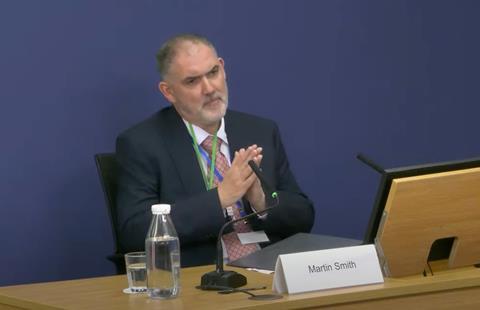
11.20am: Board papers from the period show what Page calls an 'expectations gap' between Post Office chiefs thinking the mediation process would result in token payments and apologies to victims, and Sir Anthony Hooper, who led the mediation scheme, saying it could cost millions to recompense sub-postmasters whose lives were ruined by wrongful convictions. Soon after, Page notes that the Post Office instructed magic circle firm Linklaters 'to effectively sack Second Sight'.
Around the same time, Aujard wrote to the Criminal Cases Review Commission setting out the situation with Horizon convictions. He did not mention in his letter the doubts of the credibility of expert witness Gareth Jenkins or the Simon Clarke advice that convictions may be unreliable. Aujard says he signed off on the letter but that it was written by lawyers from external advisers Bond Dickinson. Sir Wyn Williams, the chair, makes a rare intervention to ask Aujard whether he actually thought about the context before signing off on the letter. He says he thought he understood the issues at the time.
More questions from three more representatives of core participants, then Aujard's ordeal is over. We come back after the break with more from Martin Smith.
11.10am The inquiry sees a damning assessment of Post Office investigators, produced by Second Sight's Ron Warmington in early 2014. He said that investigators 'often appear to have paid scant attention to the interviewee's assertion of innocence [and] little or no willingness to establish the underlying root cause of any given shortfall'. Sub-postmasters are treated like 'enemies of the business', it concludes.
Page says this was a document that demanded immediate action from Aujard. He says his view was that this was just an interim report which required investigation 'in due course'.
11am: Apologies for the later start this morning - blame computer problems. Shout out to Law Society IT whizz Aaron for getting us back on track.
Anyhow, the inquiry has this morning heard firstly from Chris Aujard, general counsel with the Post Office from 2013 to 2015 - about the time when internal doubts about the Horizon system really rose to the surface. Aujard is appearing remotely.
Victims' representative Flora Page says Aujard led a legal team that engaged in 'needless adversarialism' and asks whether there was still a combative attitude.
Aujard says he can understand why it might seem like that from an outsider's perspective.
'Was the board going into 'cover up mode'? asks Page.
'If it was I certainly didn't recall it at the time,' says Aujard.
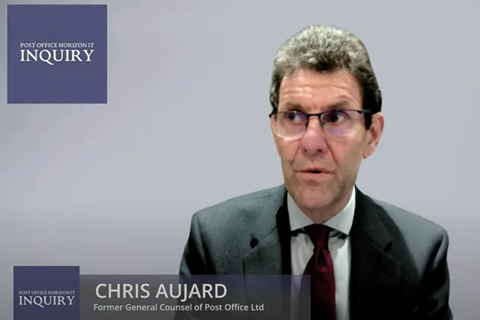
Former Post Office general counsel Chris Aujard and Martin Smith, a solicitor formerly with Post Office advisers Cartwright King, return for a second day of giving evidence, each facing questions from sub-postmasters' representatives.



































